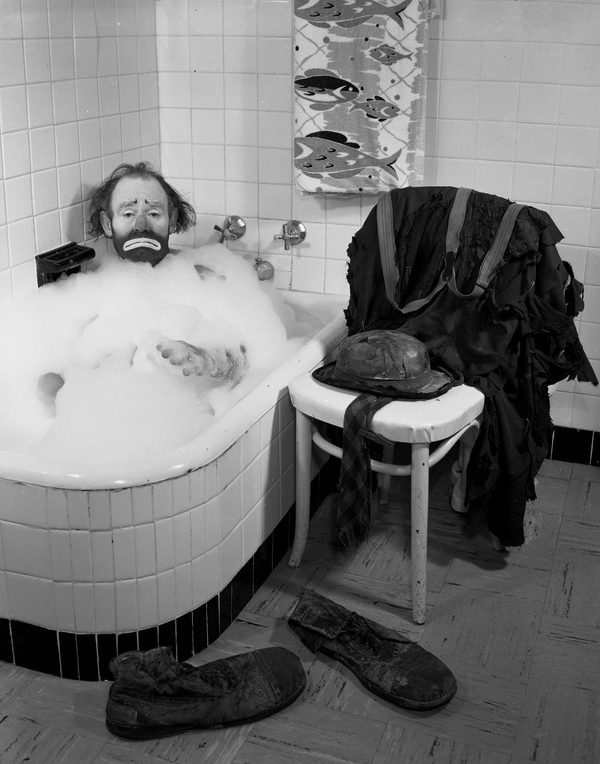Ringling Brothers circus clown Emmett Kelly in a bubble bath: Sarasota, Florida; photo by Joseph Janney Steinmetz, c. 1955 [public domain /
Wikimedia Commons]
***
(21 January 2001. Revised terminology on 8-7-13 and 4-2-16)
***
***
Mario Derksen’s words will be in green. Some time after this dialogue, he became a sedevacantist (0ne who denies the validity of the current sitting pope). I also dialogue with a second reactionary (words in blue).
* * * * *
I have a challenge for you guys. The reply could come back from the sisters that they are only being “ecumenical” by allowing the use of their facilities by Wiccans. . . . Add to this the fact that Pope John Paul II was publicly present with African and North American animists and Zoroastrians at a religious gathering in Assisi in 1986.
Here’s the unfolding news on our coven of witches. We have sought to get the bishop to place the Franciscan Spirituality Center under interdict if they persist in hosting the Wiccan coven. But when I spoke to one of our most orthodox priests to get his support for that idea, he resisted it by bringing up the example of…..you guessed it, the Holy Father’s hosting of pagans at Assisi, including his allowing them to use Catholic facilities for pagan ceremonies.
I told him that I believe that this is precisely why the Holy Father should not be involved in such things as the gathering at Assisi and that it is an example of ecumania rather than true ecumenism.
*
You asked for it! Are you sitting down? :-) I guess so, if you’re at your computer . . . I agree with you (based on what I know from your report) that what is going on in your area with the witches is weird and scandalous and disgraceful, for whoever is allowing it. I disagree (surprise!) that this is the equivalent of, or consistent with, or logically flows from, legitimate Catholic ecumenism or the Assisi meeting. Why I think that has been well laid-out in my papers on ecumenism; I need not reiterate it here (nor do I wish to). But I have more than enough to express in this letter nonetheless. In my last exchange with you guys I expressed what I feel are the glaring logical fallacies and extremities of a hostile opinion towards (real Catholic, Vatican II) ecumenism.
I don’t think you guys “get it” with regard to ecumenism. You don’t seem to make the necessary (elementary) distinctions, and you jumble things and ideas together that don’t belong together (even though liberals and suchlike often join them, to the detriment of everybody – to that extent, you repeat their errors, though for much different – far superior – reasons and motivations). There are liberal lies about and distortions of ecumenism, and there are “traditionalist” lies about and distortions of ecumenism. The liberal “useful idiot” buffoons get more and more heterodox and wacko and New Age, and the radical Catholic reactionaries get more and more conspiratorial and exclusivistic; almost Pharisaical at times, in their strong tendencies towards absurd, short-sighted hyper-legalism.
Some reactionaries I’ve seen (not you guys, I hasten to add) make the John Birchers look like flaming Leninists. LOL Many would have been Arians or Nestorians or Monophysites in the old days, I am quite convinced (or Old Catholics, with Dollinger in 1870): fighting the “liberal” innovations and corruptions of Nicaea and Ephesus and Chalcedon alike, which (so they would tell us) “threaten passed-down orthodoxy.” Down with development! Down with new and fresh approaches from the same orthodox Catholic standpoint (e.g., St. Francis, St. Thomas Aquinas, St. Ignatius Loyola, St. Therese of Lisieux, Ven. John Henry Cardinal Newman, Pope John Paul II, etc.), in order to deal with and better reach modern man and the secular society we find ourselves in. Down with increased sophistication and nuance and a proper, orthodox sense of social and theological progressivism.
Such nay-saying is, I think, the equivalent of anti-intellectual Protestant fundamentalism, stuck (in their case) in the 1890s, unwilling to admit that there has been such a thing as the 20th century, or a Bible translation other than the King James.
St. Paul must have been a modernist and dreaded “ecumenist,” too, I guess, when he sought to approach people differently, based on their place in the scheme of religions and ideas. “I have become all things to all men, that by all means I may save some.” He paganized himself in the market square at Athens, referring to weird false gods and even pagan poets. What an indifferentist, he! Obviously compromised . . . clearly he would have kissed the Koran too. Tsk, tsk, tsk! Shame on him. How did he make it into the Bible anyway? Maybe the liberal Chalcedonians screwed around with the “real” Bible so Paul could get in . . . . . .
[don’t make the mistake of thinking that my sarcasm does not have a deadly serious meaning underlying it. Some ideas require sarcasm to be refuted – pure, non-acerbic reason not having worked very well]
And then there is simply orthodox Catholic ecumenism, standing in that glorious position of the “middle” or the mainstream, which Chesterton refers to often (in different terms) in his book Orthodoxy.
Why is this so difficult to comprehend or to accept? You want to put the Holy Father out on the extreme fringes of ecumenism (in the wider, not always orthodox sense of the word)? Go ahead . . . I think it is nonsense (in fact, not because I am some sort of “papal slave,” as those obedient to the pope are often falsely accused of being), and I think you make yourself look foolish in so doing.
I have always said that radical Catholic reactionaries of the common sort today exhibit a problem of faulty thinking, perhaps foremost, but also of a loss of supernatural faith (in the full Catholic sense). It blends (quite ironically and astonishingly) the Protestant principle of private judgment with the liberal principle of (arbitrary) pick-and-choose. I see both of you falling into these traps, to some extent, the more I read about what you believe. It is distressing. Do I have to observe the tragic spectacle of one or other of you going SSPX one of these days? I guess human nature is prone to separatism, disobedience, and the creation of conspiratorial theories.
Once a false idea takes hold in a group, it spreads like wildfire or cancer. This reactionary stuff reminds me (sociologically) of my former days in the charismatic denomination Assemblies of God. Though it formally decried the “name-it-claim-it, hyper-faith, God always heals” heretical nonsense of Copeland, Hagin, Tilton et al (i.e., the fringe elements of pentecostalism), yet there were people everywhere to be found within A/G ranks who believed this claptrap, because it was tolerated and not severely rebuked. That led me to do a huge refutation of it way back in 1982, but I had little success with individuals, once they had “caught the disease” of the so-called prosperity gospel. It was never an intellectual process to begin with for these people, but an ear-tickling and narcissistic path, so Bible-quoting and reason was of little use.
I made a similar point when I critiqued The Remnant. I argued that technically the views expressed might be orthodox and non-schismatic, but when you come right down to it, the views were so close to schism and disobedience (and the pope and Vatican II railed against so incessantly), that in a very real practical (or what one might call a psychological) sense, there is virtually no difference. And this “ultra-conservative” mindset seems impervious to all reasoning and appeal to any Church teaching whatever (at least in my experience). In fighting so hard against the liberals (for which you have my highest commendations), you have, strangely enough, adopted a hybrid persona of liberal Catholic/fundamentalist Protestant/”orthodox Catholic” – having assimilated key ideas and premises from all three camps, yet not seemingly aware that you have done so.
There is an old saying: “scratch a Protestant and you get a Nestorian.” I think there is a lot of truth to that. Well, now I suspect that if you scratch a reactionary you may wind up with a closet-SSPXer (i.e., schismatic). The behavior of those in the Remnant subsequent to my critique spectacularly confirmed my thesis in that paper, I think. The quasi-schismatics either did cross the line or got dangerously close to it (e.g., the ISOCC video), while Stephen Hand started to see the writing on the wall and got out. I’m not saying at all that I caused all this with my paper (of course not! LOL). I’m just making a sociological observation that what I warned about indeed occurred (sociology was my major, after all, and I do manage to utilize a wee bit of it every now and then :-).
Anyway, that’s how this stuff strikes me (in my analogical mind). None of this is intended to be personal at all. As always, I am strictly criticizing ideas and what I see as tendencies and trends of thought (which necessitates much generalizing and broad analysis), without ever implying obstinacy or lack of intelligence or bad motives or anything of the sort. I hope you guys know me well enough to know that. But you asked my opinion, and I have given it. :-)
You guys have been pretty silent on this. Anybody agree with me? Disagree with me?
*
Speaking for myself, that is because I am sick and tired of this so-called reactionary debate. I was sick of it before I did the piece on the Remnant over a year ago. I only did that because it was sort of a “deal” I made with [Name; one of the correspondents]. I think it zaps energy, creates needless animosity, is one of Satan’s clever schemes to divide the Church, and detracts from the truly important business of sharing the Gospel and the truth of the fullness of the Catholic Church with Protestants and infidels alike. And it takes people away from other far more important issues such as charity, social and pro-life activism, and family and devotional time.
Wish I’d shut up? ;o)
*
No, I would never tell anyone to do that (well, maybe Jesse Jackson), being the Socratic and passionate advocate of free speech that I am. :-) My wish for you is that you could straighten this out for yourself, stop being so “troubled” and attain to the trust and comfort that God is in control of His Church, warts and all, 100% sinners and all, and that the present Holy Father is one of the greatest popes in history. That’s my wish for you two, and others of like mind. Pray for real problems, do all you can to resolve them, rebuke (real) hypocrisy as you wish, but please, stop being so “troubled.” You ought to be at peace with yourself, your God, and the Church. If you wanted to continue worrying about everything, you could have stayed in man-centered Protestantism, where there is every reason to be concerned about any number of heterodoxies and morally relativistic beliefs.
I think that ultimately it is a matter of faith, and that reactionaries – somewhere along the way – have lost some of this faith in indefectibility and ecclesiological infallibility and the Holy Spirit’s guidance of Holy Mother Church in all times and places.
* * *
[exchange with a second reactionary]
I much appreciate your cordiality, as always, if not several of your ideas. I will make a few replies, because – as you know – I try to avoid lengthy dialogues on this topic. I have more than enough on my site, and not much to add to them, at least at this point in my life. But this very letter is a case in point, for one of my gripes. If I wasn’t doing this, I would be writing to a Lutheran friend who may convert. In my opinion, that endeavor would be far more important than this little debate. I’m tired tonight and don’t know how much writing I will be able to get done. But here I am because you’re so nice and I wanted to at least offer some response. :-)
I don’t think that this was really [Name’s] point. I think the real point was that, de facto, the Assisi event is USED to explain and justify such Wicca events within Catholic territory.
So what? People commit fallacies all the time. If I tried to refute all of those I would do nothing else (actually, I think I do do quite a bit of that, come to think of it LOL). But I was trying to get at the deeper, underlying assumptions, as is my custom and usual methodology.
OK, shift back a few gears concerning your word choices now…. :-)
Hey! I resemble that remark! (making my best Curly-face) LOL
The fact of the matter is that the traditionalist realizes that the perhaps intended ecumenism of a few orthodox Cardinals in the Vatican just isn’t there. It’s not practiced. You may point to this and that document pointing out that, doctrinally, the idea is orthodox, but DE FACTO, it just doesn’t happen.
So ECT wasn’t real? The Lutheran Agreements weren’t real? Or the many agreements with the Orthodox? Or the siding with the Muslims at one of those feminist world conferences? I guess we really do live in two different worlds, my friend.
The Vatican may say something about religious liberty, and the world takes it to mean indifferentism.
Why should I care what the world thinks? They think a lot of false things. It matters not what the Church does. It will always be wrong in the world’s eyes, either triumphalistic or touchy-feely inclusivistic (sometimes both simultaneously, so we are told by our holier-than-thou secularist critics).
Sorry but I can’t help putting these words now: BLAH BLAH. That “middle” ground may exist on paper, but not in the real world. It’s just not there.
It certainly is. The center ground is orthodox Catholicism, which has always existed, and always will exist. My primary point was concerning orthodoxy, and if you claim that it has ceased, then you have accepted defectibility and are no better than an Anabaptist.
Who cares about Spong and McBrien? See, this is part of your problem. You are concerned about the buffoons, whereas anyone who has any sense of the perspective of history knows that their time has long passed, and that they are living fossils (just like the stubborn and persistent Marxism at American universities). You are trapped in your own time – the current zeitgeist -, like a fish in a dinky tank. This is why history is so important, among many other reasons. And Church history is more exciting than any other.
“clearly-schismatic Remnant”?? I think it’s bold enough for Stephen Hand to claim it’s schismatic, but now you’re saying it’s CLEARLY schismatic??
Yes; not that I am an expert, but from what I have seen, it is quite sufficient to convince me that they are schismatics, at least in spirit, if not in letter, per my reasoning all along. The spirit comes first. One has a spirit of lust before one commits the act of adultery. Adultery of the heart comes before adultery of the genitals. One has a spirit of division (Luther in 1517 / Lefebvre, Dollinger, Kung, Curran, and Matthew Fox) before one actually splits “in the real world” (Luther, 1521). This shouldn’t be any sort of controversial observation on my part. But to one who is a canonical, liturgical, and conciliar hyper-legalist, I suppose it would seem that way.
(The SSPX, by the way, was allowed to say Mass on some of the side altars during the Jubilee Year—perhaps this is one of Rome’s ecumenical favors).
Indeed it would be that. There is a place for prudence and diplomacy, in the attempt to win people back to the faith and the Church.
Ah, there we go! That’s precisely what I think about the so-called “middle ecumenism.” Technically, it may be correct and praiseworthy, but it ain’t there in practice.
So, according to you, all ecumenism (in reality, in practice) is wacko indifferentist, touchy-feely, liberal, modernist, relativism. Is that what you wish to contend?
Hold it right there, Dave. Let me show you what the problem is with your position here. We
cannot heal anyone else or convert anyone else before we haven’t solved our own problems.
If that were true, then we would have done no evangelism for 2000 years, because there have always been problems in the Church, due to sin (not in its dogma). You’re digging yourself deeper and deeper, my friend. This is utterly nonsensical. I’m really surprised you would make such a weak and pathetic argument as this.
By converting a Protestant to Catholic, you’re doing a great thing, but it doesn’t take long and he’ll realize that there are tremendous problems in the Church, and if he realizes this soon enough, he may not even convert to Catholicism!
How, then, can it be that there has been a tremendous number of converts despite your Chicken Little scenarios about the current-day Church? Hmmmmmmmmmm????????????? Were all us converts dupes who should have stayed in the “conservative” denominations? I’m here in the Church because it taught against contraception, like all Christians did before 1930. How many Catholics disbelieve the teaching was absolutely irrelevant as to my decision to convert or not. The doctrine was correct. Same thing with divorce. Same thing with abortion. This is what attracted me to the Church, because moral laxity can be found anywhere (original sin). But true, traditional, unchanging Christian moral teaching is only found in one place.
That’s what I had been seeking for, for ten years as a serious Christian. I found it, and here I am, and quite glad to be here, thank you, and not at all constantly “troubled” like you two seem to perpetually be. It must get very tiring. I’ve found the pearl of great price. You guys seem to want to prove that the pearl is really a jagged, stinky lump of coal, or worse (an almost-dead jellyfish, perhaps?). You won’t succeed with me; I’ll tell you that right now.
So we’re supposed to stop making converts and devote ourselves to house-cleaning exclusively? Yeah, right. Where in the world do you find that in the Bible or in the Church’s directives to laymen? My vocation is as an evangelist and apologist. By definition the former is to the non-Catholic, and the latter is primarily to be used as a method of clearing roadblocks to the Faith (though it is useful for bolstering the faith of Catholics also – but that, too, has nothing to do with most of the reactionary critique). These offices and tasks don’t cease because there are “problems” in the Church – as if that is some new thing that wasn’t always there.
If the Protestant-turned-Catholic reads what we believe about the Eucharist, it won’t take long for him to ask, “Wait a minute, why do you give it in the hand? And why doesn’t Father take more care in handling the Body and Blood of Christ?” It is such things that, IF NOT WORKED OUT, will STOP people from converting.
Again, this was not at all true in my case, and I don’t think I am all that un-representative of the average fairly-educated convert. We all know (and knew) that there are problems of liberalism in the Church! It doesn’t take a rocket scientist to figure that out. Liberals (like the poor) will always be with us. But – again – only one Church has true doctrine in toto, true moral teaching, the most sublime spirituality, saints and miracles and all the rest, and the unbroken history to verify those. That is what brings converts in, because we are well-acquainted with the absolute chaos and anarchy in Protestantism.
So, in short, I think you conservatives are still living in a fancy wonderland of “everything’s alright with the Church,
Doctrinally, yes. In practice, we never reach perfection, and will always fall short as a group. Whoever says “everything is alright” (which I have never done nor would ever dream of doing), is the one in a wonderland, not a realist so-called “conservative” such as myself. If I thought there were no problems how could I give you reactionaries such a hard time, as one of the “problems” I would identify? Why would I have a page on modernism? Etc., etc. C’mon! You can do better than this. I believe the doctrines are very much “alright,” and infallible.
and John Paul will be called ‘the Great’
He will indeed, as (I believe history will record) the vanquisher of modernism, Communism, the culture of death, and unisexism, if not many more things.
and a new Springtime is ahead in the Church”…….
Absolutely. This has always been the case in the next century after a terrible one, as Chesterton loves to point out (“the Church has gone to the dogs at least five times. In each case the dogs died”). The 20th has been the worst in history, by far. So the 21st century (if history teaches us anything) will be a time of one of the greatest revivals in the history of the Church. This is what the late Fr. John Hardon (flaming modernist that he was) believed. The pope believes it. So do I. If you want to sit around and moan and groan and cry in your beer and be a pessimist and a cynic and a doomsayer while revival breaks out all around you, go ahead. You won’t take away my excitement when I start to see it. No way! In fact, I say that the seeds of the revival are all well-planted already. We will see the growth soon, no more than 20-40 years away at the latest, I would speculate.
unfortunately, the doctor who can’t figure out what’s wrong with the patient until he’s almost dead will have a much harder time healing him.
If the Catholic Church were “almost dead,” we would look a lot more like Anglicanism or even more far-gone denominations like the United Church of Christ. You want some profound deadness? Grow up in Methodism in the 60s as I did. Deader than a doornail (at least the church I attended). I don’t think you have the slightest inkling of what real “near-spiritual death” looks like. Whole denominations which fully accept abortion and fornication and homosexuality. And you’re most concerned about Catholic ecumenism???!!! Good heavens! What a waste of energy and emotion . . .
This is depressing . . . the only thing that cheers me up in such a discussion is pondering the revival that will almost certainly occur in this century. I used to think (as an evangelical dispensationalist enamored of pop prophecy) that the world would end in 10, 20 years. I’m glad that I take a much longer view of Church history now, rather than dwell in this sort of doom-and-gloom conspiratorial apocalypticism which is yet another hallmark of reactionaryism.













